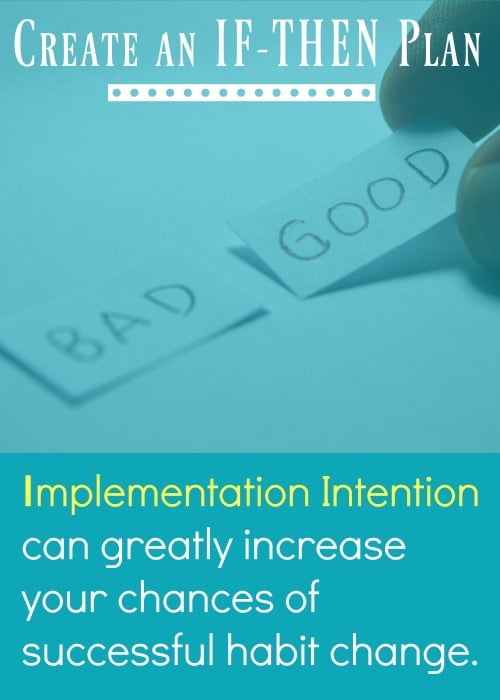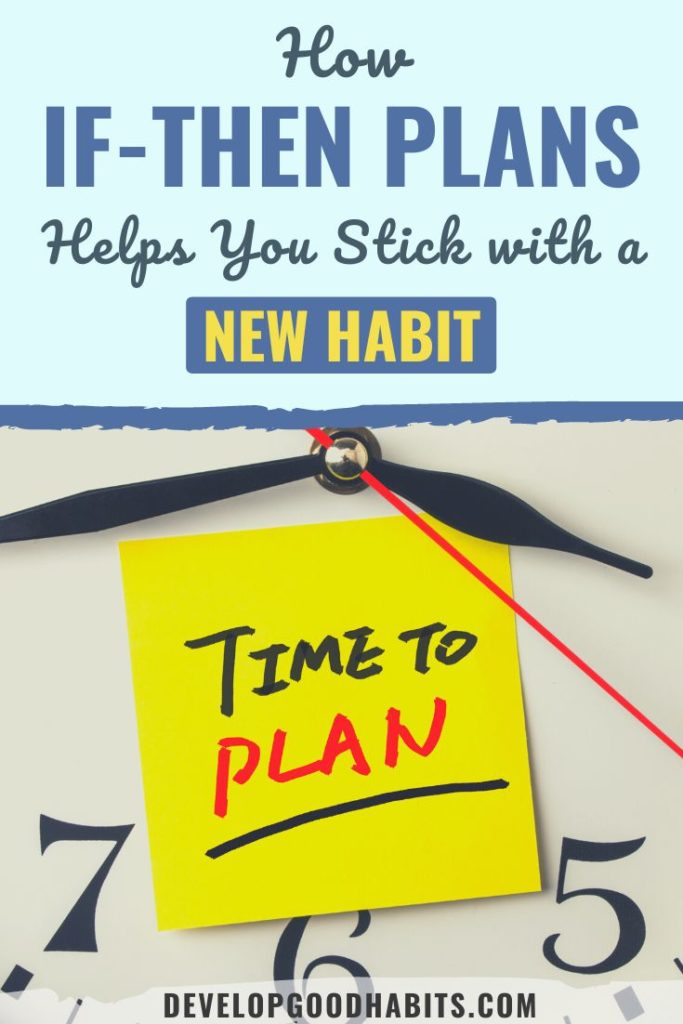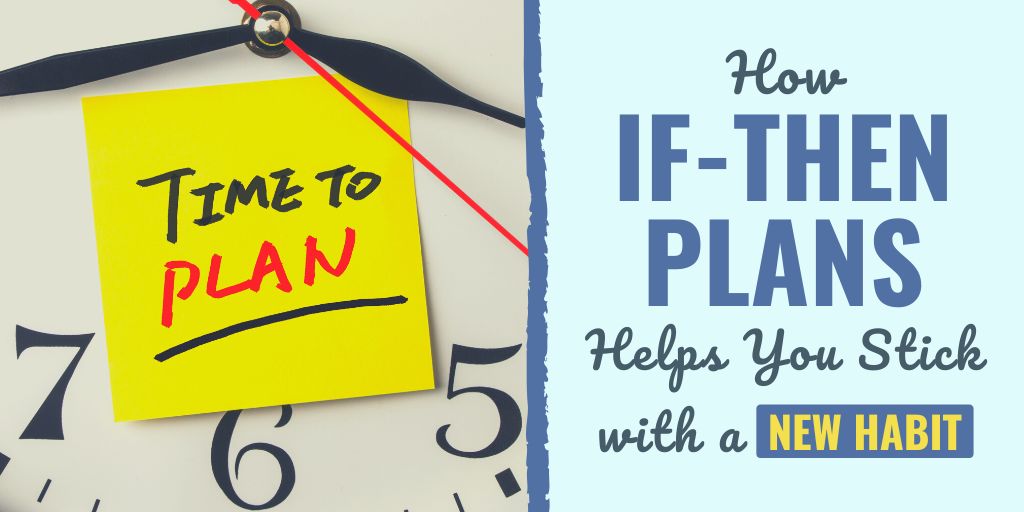When it comes to a habit change, we all start with the best of intentions.
We promise to make a change, commit to it every day and imagine a perfect future where we’re no longer doing a bad habit.
Then what usually happens?
Failure.
The question is: Why do people fail when they start with the best of intentions.
Are they less disciplined? Is the change less important to them? Do they lack motivation?
Are they consciously failing their habit change or are their unconscious decisions simply getting the better of them?
While everyone has their own excuse for failing, there is one that stands out:
Not having “if-then plans” in place.
In this article, we’ll discuss the benefits of the if-then plan and how to use it the next time you’re trying to make a major habit change.
Why People Fail to Change Their Habits
Recently we discussed the differences between streak habits and occasional habits.
Streak habits are those tasks you complete every single day (like flossing), while occasional habits are done only on specific days (like running or lifting weights).
Even though there’s a difference between these two habit types, they both require one crucial ingredient—planning.
Countless research has shown that the best way to complete a goal is to have a strategic plan. Moreover, this plan should include specific responses for how you’ll deal with temptation and obstacles.
While having desire and motivation are important for making a change, they’re not enough when it comes to dealing with temptation.
Think of it this way…
Right now, we’re approaching the New Year. Lots of people have a genuine desire to change their lives, so they make resolutions. Yet, 92% of them will fail to fulfill their resolution (according to Forbes Magazine). That is a lot of failure.
Why does this happen to many people?
The answer is simple—they don’t create an if-then plan.
What are If-Then Plans?
Implementation intention is the fancy term for if-then planning. This concept was created by psychologist Peter Gollwitzer in the mid 90’s.
In one experiment, Gollwitzer asked his students to mail in an assignment two days before Christmas.
One group was simply given the assignment, while the other was asked to form specific if-then statements: When would they mail it, where they would mail it, and how they would mail it.
The results?
The first group (no specific instructions) had a 32% success rate. And the second group (if-then instructions) had a 72% success rate. That’s more than double the percentage—simply by creating a plan.
The ramification of if-then planning has a huge impact on your next habit change.
Instead of creating goals or action plan, the best strategy is to identify your triggers and figure out how to avoid them.
EXAMPLE:
Let’s say you want to stop wasting money.
This can be tough to turn into a daily routine. In fact, focusing on not spending money is often counterproductive. That’s because the act of trying to not think about something often brings it to the front of your mind and make you desire that item even more.
In Willpower Instinct, Kelly McGonigal described an interesting experiment where participants were asked to think of anything besides a white bear.
And as you probably could guess, the only thing that popped into their mind was a white bear. This experiment (and others) show that often when we’re trying to avoid a certain habit; we end up fixating on it and succumbing to the temptation.
When it comes to a nebulous habit change like “stop wasting money,” you’d be better off identifying the “wasting money triggers” and creating a series of if-then plans for how you’ll overcome them.
You could do this in a few ways:
You get the point.
The point behind an if-then plan is to fully understand how you often fail and create a plan for what you’ll do when a specific scenario comes up.
How to Create Your If-Then Plans
What’s the secret to making an if-then plan?
Here are nine-steps for implementing this strategy:
1. One habit at a time.

No matter what, only focus on changing one habit at a time—even if two aren’t related to one another. (For more on this, read the article about the effects of ego depletion.)
2. Set a target goal.
A goal should be a big picture idea of what you want. It should be specific as possible. “I want more money” is not a good goal, but “I want to save $20,000 by the end of 2014” is perfect.
To learn how to create good goal statements, check out the 21 examples presented in the video below:
3. Create mini-goals.
Each major goal should have a series of smaller milestones. These will keep you energized and focused on what needs to be done.
Not only are these important for your overall success, they will help you deal with the specific triggers that often pop up as you work towards a major goal.
4. Set a baseline.
It is hard to achieve a goal without having a good starting point. For instance, if you’re spending too much money, then you should start by tracking your daily expenditures. See where the money is going and “what” you’re typically buying.
5. Spitball ideas.
Sit down and analyze the habit you’re trying to change. When do you do it? What creates the impulse to do it? Are there certain people who “cause” you to do the bad habit?
Getting as much data as possible will help you create good if-then statements.
6. Track your bad habit.
Take a notepad with you for a few weeks. Whenever you think about doing a bad habit, write down the stimuli around you. Certain sights, sounds, smells and even people can act as triggers.
Eventually, you’ll be able to come up with if-then statements like: “If I am with Bobby, then I will only bring $40 in cash and nothing else.”
Here's are some resources you may want to check out:
- 19 Best Habit Tracking & Building Apps
- 37 Printable Habit Tracker Templates
- 49 Bullet Journal Habit Tracker Ideas & Examples
7. Develop a replacement habit.
Nature abhors a vacuum. If you’re trying to eliminate a bad habit, something else needs to take its place. It has been proven that it’s far easier to substitute a negative routine instead of trying to get rid of it entirely.
As an example, let’s say you determine that “wasting money habit,” is your way to reduce stress and relax. You could substitute it with an exercise habit.
So you would create an if-then statement like: “If I feel like buying something from Amazon, I will instead go for a 30-minute walk.”
8. Set a firm start date.
Don’t put things off indefinitely or they’ll never happen. Set a start date for your new habit. You can continue to refine your process and your statements as you go along.
9. Use failures to refine the if-then plan.
Failure happens. Don’t let it get you down. If you fail just add to the list more ideas for your statements. What caused the failure? Was it a specific habit trigger you initially missed? What can you do next time?
You probably won’t be perfect in your first attempt to change a habit change. In fact, it’s best if you expect to slip up along the way. The people who succeed long-term realize that one single mistake is not the end of the world.
They try to minimize the damage, fight off the “what the hell effect” and climb back on the horse.
Final Thoughts on If-Then Plans
The secret to making a lasting change is to create a series of if-then statements for your habits.
Create a list of how you’ll respond to specific scenarios and use these whenever you’re tempted to follow through on a negative impulse. You’ll find it’s easy to stick with your commitments when you have a clear set of instructions for every single situation.
If you're ready to really start life planning, here are some resources to check out:
- 13 Steps to Write & Set SMART Goals
- How to Do a SWOT Analysis on Your Personal Life
- WOOP Goal Setting Strategy: 4 Steps to Get Started
- 9 Reasons You’re Failing at Life (and What to Do About It)
Finally, if you need help with building habits, then check out this nine-step blueprint that walks you through the entire process of creating lifelong habits.)



So basically we plan to fail when we fail to plan.
We hope “it will be all right” and if it’s not… well you described it perfectly SJ.
I remember times when I was serious about something, eg. choosing the university. I understood it won’t happen just because I wish. I sat, gathered data, compared, pondered about cons and pros…
And being serious about your habits is as much important as your studies or the carrer, if not more. Your life literally consist of your habits.
I especially like point 5. Spitball ideas. And do it in writing! I did it with a few of habits I don’t really want to develop (out of my comfort zone). I procrastinate. But because I worte the ideas down on how to develop them, what disciplines to include and so on, I just can’t dismiss them. Those ideas nag me all the time.
Michal,
You got it. I am a big fan of planning of course, because I do think a plan is key. But in some ways if-then planning is also anti “overplanning”. In my mind it is less about the rigid planning of everything you do rather than creating a realistic “if this happens then….” scenario to prepare in advance to reacte in the least harmful way to your goals and habits.
Love the post, Steve 🙂
I have a love/hate ‘relationship’ with planning. In certain situations, I love planning, in others, I prefer not planning and just going for it.
But, I also realize the importance and usefulness of planning. For successful habit development, we need to have a plan, we need to be prepared 😀
I don’t have much of a problem with sticking with my habits (except for a couple of days. I have “skipped” some habits to catch up on other things). But, generally, it has worked well. I do have an if-then plan for those habits (If I skip a habit, I try to make it up using my free time, but sometimes, I do find it difficult to spend my free time on these habits).
Anyways, I do appreciate the tips, Steve 🙂 Thanks!
Honestly, the more I deep-dive into habit development, the more I realize that planning really helps. For instance, this month I’m trying to give up takeout/fast food. The only times I’ve slipped is when I didn’t have a plan for those times when I’m away from my house and don’t have something ready to eat. I feel the if-then plan is really effective for those really tricky habit changes.
These were all very good ideas, well presented. Unfortunately, they immediately reminded me of the old Navy saying:
An officer doesn’t drink.
But if he drinks, he doesn’t get drunk.
But if he gets drunk, he doesn’t fall down.
But if he falls down, he falls on his insignia.
Keep up the good work Mr. Scott and I’ll try to be more serious if I post again.
No worries — I appreciate funny responses. You’re right, there is a familiar pattern to the if-then plan. The idea here is to make sure you have some sort of contingency plan for those moments of weakness. We all experience temptation, but the people who overcome them are able to know what to do in any sort of situation. Thanks for stopping by!
Planning is definitely crucial man. When I was building my habit of working out, I knew what could derail my workouts. Things like fatigue and injuries had killed me in the past. So I made if-then statements for myself without realizing there’s a bunch of science behind it like you stated here. It worked crazy well.
Great stuff man.
Hi SJ,
The if-then approach to overcoming old habits and creating new ones seems really powerfully. When we write down triggers and our responses in this way, it allows us to be objective and create new if-then approaches.
Many thanks for sharing this powerful technique, SJ.
Happy Thanksgiving!
That’s really fascinating. I know writing something down will affect your ability to actually go through with it, but I didn’t know it was that powerful. The brain can be a strange thing. When we focus on not wanting to do something, we often end up doing it anyway.
I’ve often thought that obsessing over something can be counterproductive. It’s like the last time I had writer’s block. All I could think about was the fact I had writer’s block. It actually consumed more of my thinking than my thoughts on what I wanted to write. It felt as if my thoughts alone were bringing it into existence. Maybe if I had created an “if-then” plan for something like that, i could overcome it more easily.
Steve,
DIGGIN’ THIS!
I just found this site after finishing two of your books, How to Write an eBook in 21 Days and Internet Lifestyle Productivity.
There are a lot of useful nuggets in this particular post but I like especially that you aren’t afraid to link to other bloggers!
At the present time I’m less concerned about quitting bad habit, which this article seems to emphasize, and more concerned about sticking to a new one I’m starting (happens to be designing my daily and weekly routine according to Internet Lifestyle Productivity).
For this reason, the James Clear article actually was more useful to me at this point.
I’ll bookmark and come back here when I develop the character to quit one of my many BAD habits 🙂
Thanks for a concise post and one which led me to an answer… even though I found EXACTLY what I needed elsewhere, it was still “your fault” that I found it.
Keep Stepping,
Kurt
Awesome Kurt!
Glad you found the site, and of course thanks for being a loyal eBook reader. It is always appreciated. I am glad you found some immediate and useful help, even if it was from a link to James site. (He is a great blogger and sure you will find lots of good stuff there).
The best way to fix a bad habit, by the way, is to replace it with a good one, which it seems like you are doing. So keep up the good work and hope to see you around here again.
Have a wonderful day!
-Steve
Hey there! I’ve been reading your site for some time now and finally got the bravery to
go ahead and give you a shout out from Houston Texas!
Just wanted to tell you keep up the fantastic work!